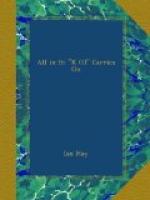“Nothing like a bit o’ fun on the way to the trenches, boys! It may be the last you’ll get!” is the only apology which Ernie offers.
* * * * *
Presently our vehicle bumps across a nubbly bridge, and enters what was once a fair city. It is a walled city, like Chester, and is separated from the surrounding country by a moat as wide as the upper Thames. In days gone by those ramparts and that moat could have held an army at bay—and probably did, more than once. They have done so yet again; but at what a cost!
We glide through the ancient gateway and along the ghostly streets, and survey the crowning achievement of the cultured Boche. The great buildings—the Cathedral, the Cloth Hall—are jagged ruins. The fronts of the houses have long disappeared, leaving the interiors exposed to view, like a doll’s house. Here is a street full of shops. That heap of splintered wardrobes and legless tables was once a furniture warehouse. That snug little corner house, with the tottering zinc counter and the twisted beer engine, is an obvious estaminet. You may observe the sign, “Aux Deux Amis,” in dingy lettering over the doorway. Here is an oil-and-colour shop: you can still see the red ochre and white lead splashed about among the ruins.
In almost every house the ceilings of the upper floors have fallen in. Chairs, tables, and bedsteads hang precariously into the room below. Here and there a picture still adheres to the wall. From one of the bedposts flutters a tattered and diminutive garment of blue and white check—some little girl’s frock. Where is that little girl now, we wonder; and has she got another frock?
One is struck above all things with the minute detail of the damage. You would say that a party of lunatics had been let loose on the city with coal-hammers: there is hardly a square yard of any surface which is not pierced, or splintered, or dented. The whole fabric of the place lies prostrate, under a shroud of broken bricks and broken plaster. The Hun has said in his majesty: “If you will not yield me this, the last city in the last corner of Belgium, I can at least see to it that not one stone thereof remains upon another.—So yah!”
Such is the appearance presented by the venerable and historic city of Ypres, after fifteen months of personal contact with the apostles of the new civilisation. Only the methodical and painstaking Boche could have reduced a town of such a size to such a state. Imagine Chester in a similar condition, and you may realise the number of shells which have fallen, and are still falling, into the stricken city.
But—the main point to observe is this. We are inside, and the Boche is outside! Fenced by a mighty crescent of prosaic trenches, themselves manned by paladins of an almost incredible stolidity, Ypres still points her broken fingers to the sky—shattered, silent, but inviolate still; and all owing to the obstinacy of a dull and unready nation which merely keeps faith and stands by its friends. Such an attitude of mind is incomprehensible to the Boche, and we are well content that it should be so.




